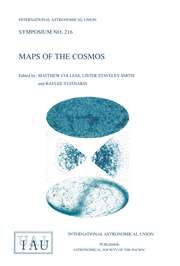No CrossRef data available.
Article contents
Inflationary universe models and clustering of quasar red shifts
Published online by Cambridge University Press: 19 July 2016
Abstract
Recently it has been shown that many of the puzzling features of conventional cosmological models (such as the horizon and flatness problems) could be explained by invoking inflationary models of the early universe with an exponential expansion phase at very early epochs. These models have the added advantage that they are able to make a definite prediction about the present matter density in the universe, i.e. they require that the density be exactly equal to the closure density which in turn can be easily estimated from the Hubble constant now known to within a factor of two. Now if one goes back to an earlier idea that explored the possibility of unusual clustering of quasar redshifts around z = 2 or 3, we get an example of another cosmological model with a definite prediction for the present overall matter density. This is a modified version of the Eddington-Lemaitre type of model which naturally accommodates such features as a clustering of quasars at certain epochs. From these models one can get a prediction for the present matter density which would be an involved function of the Hubble constant and the redshifts at which such clustering occurs. It can be shown that if such clustering had occurred at any z, the present matter density predicted would be substantially smaller than the corresponding closure density. The conclusion is that any clustering of quasar redshifts is incompatiable with inflationary universe models, indirectly providing observational support for these new theories.
Information
- Type
- V. Cosmological Studies, Clustering, Isotropy etc
- Information
- Copyright
- Copyright © Reidel 1986

